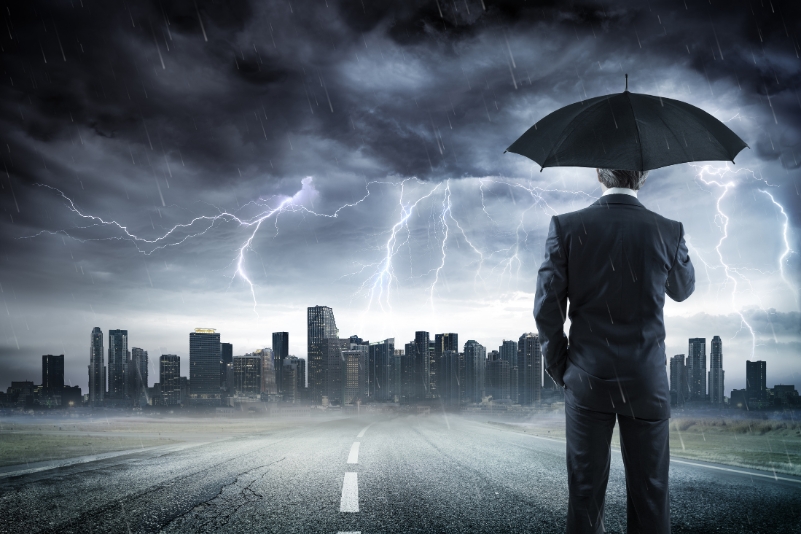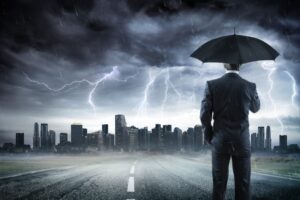Flood and Storm Insurance — How Your Business Could Be Left High and Dry
If your business is flooded, it’s not too much of an issue — as your flood and storm insurance will pay out for all the damage, right?
Unfortunately, that’s not always what happens.
In most circumstances, insurers treat flood damage and stormwater damage differently. Meaning, it’s you who has to find the cash for hefty reparation, replacement, and downtime expenses — while the insurer washes their hands of the whole situation.
Don’t be caught in this trap! Here’s the alarming truth about commercial flood insurance — and how you can ensure you’re completely covered.
Flood and Storm Insurance for Commercial Buildings — The Crucial Difference
Virtually all commercial property insurance policies include storm damage cover, but flood insurance cover isn’t always addressed.
Meaning, if your office is underwater after a storm, you’re covered — if it’s submerged after a flood, you’re not.
Ten years ago, due to an increase in flood cover claims, insurers became much more strict — resulting in hundreds of requests being disputed and rejected. In an effort to reduce uncertainty, and allow policyholders to know exactly whether they’re covered or not, the Federal Government decided a strict definition of ‘flood’ was required.
The Definition of a Flood
In accordance with the Insurance Contracts Regulations (2017), a flood is defined as water that escapes or is released, from a creek, river, lake, canal, dam, or reservoir.
So, if a riverbank breaks, your commercial property is penetrated by water, and you have business flood insurance — you’re protected. If you only have storm cover, the chances are you will be turned down in the event of a claim.
The Definition of a Storm
Most commercial buildings insurance policies protect you in the event of ‘water run-off,’ ‘rainwater,’ and ‘storm.’ While the definition may vary slightly from insurer to insurer (check your policy), generally they mean;
Rainwater — water that falls as rain and subsequently flows over the top of the ground, including water that overflows from gutters and drains.
Water run-off — rainwater that collects on typically dry land and then flows overground, including water overflowing from spas and swimming pools.
Storm — severe weather conditions that include powerful winds, lightning, rain, sleet, snow, hail, and/or dust.
Understanding the difference between flood vs storm cover allows you to make an important decision — whether storm insurance is sufficient for your business, or if you need additional commercial flood protection too.
Does Your Policy Include Storm and Flood Insurance for Commercial Buildings?
Most business and office building insurance policies include stormwater cover. And, while some providers will include flood damage, not all of them do.
Therefore, if you’re unsure if you’re protected — check your insurance documents now!
Read the Terms & Conditions of your policy, especially the exclusions and inclusions. If you’re still uncertain whether you have business insurance flood cover, call your insurer, insurance advisor, or broker. Not only will they provide a definitive answer, but also take action to provide commercial flood insurance if it’s needed and you’re currently unprotected.
Furthermore, while you’re checking your policy, it’s worthwhile investigating whether your current cover includes protection for damage occurring as a result of cyclones, snow storms, wind, cracked gutters, and burst mains pipes.
Does Your Business Need Storm or Flood Insurance for Commercial Property?
Wherever your business is located in Australia, severe storms are possible — therefore it’s important you have storm cover as a minimum.
Deciding whether your operation needs flood protection depends on your commercial property flood risk.
If your property is in a flood-prone location, near a water source, and in a low-lying area — it would be sensible to protect your enterprise with flood insurance cover. However, if your commercial building is away from reservoirs and rivers, and located on high ground, flood protection is less of a priority.
What Happens If I Claim for Flood or Storm Damage?
After you have made your claim, the insurance company usually dispatches a loss adjuster to investigate. Typically, they will look at what caused the flood or water damage, the extent of the damage, estimate the total cost (including replacement and repair) — and decide whether your policy covers the event.
In complicated claims, especially where the adjuster is unsure whether the water damage arises from stormwater or floodwater — they may employ the services of an expert hydrologist to investigate.
Don’t Leave Yourself Exposed — Check Your Policy Today
Floodwater damage can devastate your business — not just causing damage to your property and contents, but also preventing your enterprise from trading.
Many operations believe they’re covered by flood insurance on their standard commercial building policy — unfortunately, that’s not often the case.
PIB, specialists in business building insurance, can check whether you’re currently covered. Furthermore, we can deliver affordable flood and storm insurance policies tailored to your business risks — call us today!






